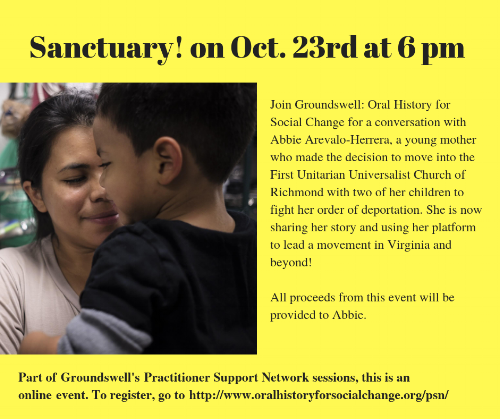REPORTBACK: Oct. 23rd PSN - Sanctuary! With Abbie Arevalo-Herrera and Lana Heath de Martinez
by Fanny García
This Practitioner Support Network session for Groundswell: Oral History for Social Change was coordinated by Shefa Nola Benoit in collaboration with Abbie Arevalo-Herrera and Lana Heath de Martinez.
On June 19, 2018, Abbie Arevalo-Herrera made the decision to move into First Unitarian Universalist Church of Richmond with two of her children and her partner to fight her order of deportation. Abbie arrived in the United States to seek asylum due to a long history of domestic violence that would only have ended in her death at the hands of her abuser. Abbie is fighting her deportation and she does so because she fears for her life if she returns to Honduras. She fights because she has a daughter in Honduras and wants to be an example of strength and justice. She hopes to reunite with her at some point and also be able to provide her daughter with the future that she deserves.
During the Practitioner Support Network session, Abbie discussed the unique efforts of the sanctuary movement and how it brings together a broad spectrum of activists, from moderate faith communities to the far left. Abbie was accompanied by Lana Heath de Martinez, who spearheaded the Sanctuary movement in central Virginia through distilling stories, policies, and theology.
Here are a few key points from our conversation with Abbie and Lana about the benefits and challenge of sanctuary:
· For Abbie, sanctuary is a sensitive location that allows her to manage her asylum case within the legal system and to connect to a social support system and build a public campaign to advocate for herself and other individuals also in sanctuary across the United States.
· Although thankful for the sanctuary she has received, Abbie believes several steps can be taken to make it better and to ensure that individuals in sanctuary are protected and supported:
1. Sanctuary is not physical shelter but a place of refuge and safety that needs systems and infrastructure in order to function effectively. For example, the culture around sanctuary needs to change. It should not be offered as a hand-me-down or charitable act but as a process in which a congregation works with the person in sanctuary (not for) and in collaboration with supporters and organizers who can implement protections and safeguards.
2. Individuals in sanctuary deserve to be treated with dignity and respect and with the knowledge that they know what’s best for their lives. This is inclusive of the opportunity to provide for their children by building an online campaign. Abbie explained that in sanctuary she is not allowed to work and causes her a great deal of distress. She believes that sanctuary spaces need to negotiate how someone in sanctuary can help support themselves exclusive of charitable donations.
3. Providing privacy as a means of showing respect. Abbie mentioned that the space she currently inhabits at the church in Richmond where she is living is also used as common areas for Sunday church services and she is often forced to give up her space when activities for the church take place. Her only privacy is in the space that has been converted into a bedroom for her and her partner.
4. People in sanctuary need space – for their children to play, for organizing, and for living. The leadership of the church has not recognized that the church is no longer just a church but that it is an active sanctuary.
Throughout the PSN session, Abbie also discussed how she has taken control of the difficult situation that she is in by choosing a team of activists and supporters who collaborate with her on getting her story out and managing her socio-economic support system. This has allowed her to refrain from seeing her as a victim of the state but as a woman and mother actively involved challenging the institutional systems that criminalize immigrants like herself. Her campaign #HandsOffAbbie for example, helps her connect to supporters outside the walls of the church in Richmond, Virginia where she has taken sanctuary.
In the second part of the PSN, Lana Heath de Martinez shared information about how the sanctuary movement has evolved and how she is providing support to Abbie by allowing her to speak and drive her own movement within the larger sanctuary movement.
LISTEN to the audio of the Practitioner Support Network session with Abbie Arevalo-Herrera and Lana Heath de Martinez, click HERE.
SUPPORT the #HandsOffAbbie campaign, click HERE.
LEARN more of Abbie’s story in this article by Dave Eggers in The New Yorker.
FOLLOW Abbie on Twitter @off_abbie.

